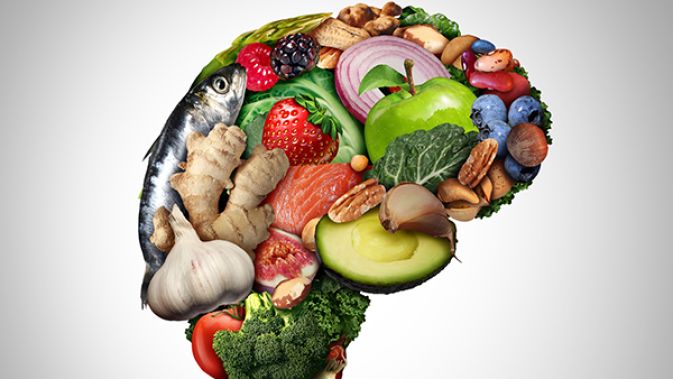
Even though your brain only accounts for 2% of your entire body weight, it consumes 20% of the energy you eat from meals. And, in order to function properly, brains require the proper fuel.
Our moods, energy levels, and even how quickly we process information are all influenced by what we feed our brains. When we give our brains the improper fuel, we may experience fuzziness or sluggishness, and we may even set ourselves up for brain disorders like Alzheimer's. On the other hand, a healthy diet tends to protect brain health.
Studies show that those who eat a Mediterranean diet, which is high in whole foods and healthy fats, have improved brain function as they get older.
A diet rich in whole foods, according to nutritionists, helps our brains thrive today and in the future. Here's the science behind some of our favorite brain-boosting foods, as well as some easy, delicious dishes to help you incorporate them into your diet.
BRAIN FOODS:
Blueberries
These berries are frequently referred to as superfoods, and rightfully so. Flavonoids, which are plant compounds, are abundant in blueberries. Over a ten-year period, people who consumed the most flavonoids in their diets had superior cognitive performance than those who consumed the least. Daily blueberry consumption was associated to improved cognition and enhanced blood flow to the brain in another study.
Add blueberries to a low-sugar whole-grain cereal, a smoothie, or yogurt for a tasty treat.
Extra Virgin Olive Oil
Extra Virgin Olive Oil has potent chemicals that help to improve brain function. EVOO has been found to reduce cognitive decline in healthy older persons when consumed as part of a Mediterranean diet. In other words, consuming extra olive oil today may help to prevent the onset of cognitive deficits that are common as we age. A Mediterranean-style diet supplemented with olive oil was compared to a low-fat diet in the study.
For pan frying, sautéing, roasting, and baking, use EVOO as your main fat. Drizzle it over salads, eggs, and whatever else comes to mind. Pair items made with olive oil with naturally lighter cuisine like fruits and vegetables for a wonderful balance.
Fish that are fatty
Regular consumption of fatty fish has been demonstrated to improve children's behavior and help adults respond better to antidepressant treatment. Some of these advantages could be explained by fatty fish's high omega-3 concentration. Herring, anchovies, trout, and sardines are all high-omega-3 species that are good for the environment.
Canned fish provides umami to dishes, a flavor that's difficult to describe but keeps us coming back for more. To mix things up, try an umami-rich meal with anchovies.
Avocados
After six months, those who ate one avocado per day increased their memory, attentiveness, and problem-solving skills in a randomized controlled study (the gold standard of scientific research). Avocados might get the credit since they're a good source of lutein, an antioxidant that's healthy for your brain and eyes.
If you don't like avocados yet, try sneaking them into other foods to become used to them. Add half an avocado to a smoothie, for example (we swear you won't taste it). Use it to replace half of the fat in brownies or muffins, cup for cup. You can also make a simple dressing with it by combining it with olive oil, vinegar, and fresh herbs.
Cruciferous Vegetables
The cruciferous vegetables kale, cabbage, broccoli, collards, cauliflower, and Brussels sprouts belong to the strong-smelling-but-oh-so-good-for-you category. These vegetables include potent chemicals that help the liver's natural detoxifying function. They even help the body's own anti-cancer defenses work better. According to new research, one of the substances present in cruciferous vegetables may protect the brain from environmental pollutants by improving the brain's ability to fight off harmful molecules known as pro-oxidants.
Roasting cruciferous veggies brings out their natural sweetness while also reducing bitterness.
Coffee
Coffee has a poor reputation. However, when used in moderation, it may have significant health benefits. When compared to drinking none or more than two cups per day, one to two cups per day may lessen the risk of dementia and Alzheimer's later in life. Drinking one to two cups of tea per day has also been related to a reduction in depression. According to another study, drinking just one cup of coffee every week can help you relax.
If you choose to avoid caffeine, decaffeinated coffee has many of the same brain benefits as regular coffee.
Food is a terrific place to start when it comes to fueling our minds. Prioritizing stress management, physical activity, and sleep are all equally important. All of them have been shown to promote brain health.
Was this helpful?
Kingerlon collects & utilizes cookies from third-parties & affiliate networks to improve user experience. If you buy a product or service after clicking on one of our links, we may get a commission.









